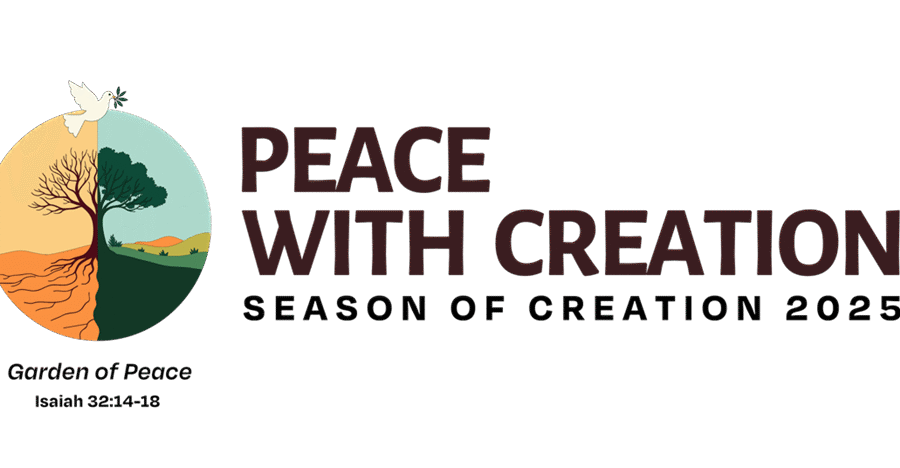Philip Hughes, Audrey Statham, Michael Noble, and Robert Dawlings
Monday, 18 August 2025
September is the time of year when many Christian people from around the world pause to reflect on God’s creation of the universe and particularly our common home Earth. The annual Season of Creation celebration of prayer, lament, praise, and confession takes place this year from September 1 to October 4.
Season of Creation has been a regular part of the church calendar for more than three decades and is an affirmation that the God we worship is the creator of all things and that being made in God’s image includes looking after creation in such a way that it brings glory to God.
The theme of Season of Creation this year, Peace with Creation, is especially urgent. We are living at a time in which creation is not at peace but is suffering many injustices from the way we treat it. While we can look forward with Christian hope to a renewed creation and God putting right all broken relationships, this is a time for us to reflect and act now on our relationship with the creation.
Read more: Chance to protect inner Melbourne nature haven
Moreover, as growing war and civil unrest are leaving many feeling powerless and overwhelmed, celebrating the Season of Creation offers a tangible way to make peace in our own circles and foster hope within our communities.
For Anglicans, the Season of Creation is part of the Communion’s fifth mark of mission: To strive to safeguard the integrity of creation, and sustain and renew the life of the earth The five marks of mission express the Anglican Communion’s commitment to holistic and integral mission.
There are many ways that parishes can be involved in caring for creation during September and through the whole year. For example, we might make special recognition of creation in our times of worship, go for a walk in nature and observe the amazing kinds of trees and animals that live with us, care for a community garden, or participate in a special project.
These small but meaningful actions remind us that peace begins with how we care for the world around us, and that each of us can contribute to restoring harmony amid global turmoil through such hopeful acts.
Read more: Mount Waverley church scores eco award
Our Prayer Book and other resources are a source of prayer and liturgy about creation that can be used to enhance our appreciation of the wonders of the natural environment and to lament about the destruction that we inflict. September might be a time to include sermons, prayers, and hymns in our worship to remind us that God is the creator of all things.
There are many ways to contemplate our natural environment in such a way that it brings us closer to God. Many of us are filled with awe when we contemplate and observe the amazing complexity and beauty of the natural world.
The Five Leaf Eco-Awards recognise parishes that adopt a commitment to care for creation and make a public statement that caring for creation is an integral part of the parish’s life of ministry and worship. Parishes might even seek to advocate for a special and local patch of nature.
The Communion Forest is the Anglican Communion’s worldwide initiative to safeguard and care for trees and areas of nature. Trees are sources of beauty, food, and shelter for us as well as the home of myriad kinds of animals, insects and other living creatures created by God.
Read more: Every single tree counts as a blessing from God. Please, join in!
And as we engage in mission by caring for our neighbours and bringing the Gospel to the world there will be many opportunities to tell of God’s loving act of creation. Wholistic mission is encompassed in the Anglican Communion’s Five Marks of Mission through proclaiming the kingdom, nurturing new believers, serving others, transforming unjust social structures, and renewing the earth.
The Fifth Mark of Mission today especially calls us to practice caring for nature—whether planting a tree, tending a garden, or advocating for the environment—as an expression of hope, healing, and praise for God’s gift of creation.
Dr Philip Hughes is a member of the Anglican Communion Environmental Network; Dr Audrey Statham, Michael Noble, and Dr Robert Dawlings contributed as members of the Creation Care subgroup of the Social Responsibilities Committee, Diocese of Melbourne.
To find out more about Season of Creation, see seasonofcreation.org.
To find out more about Marks of Mission, see anglicancommunion.org/mission/marks_of_mission.aspx.roup.
This article was originally published in The Melbourne Anglican and is republished with permission.
Want more thoughtful public theology? Follow us on Facebook and subscribe to Engage.Mail, Zadok and Equip.
